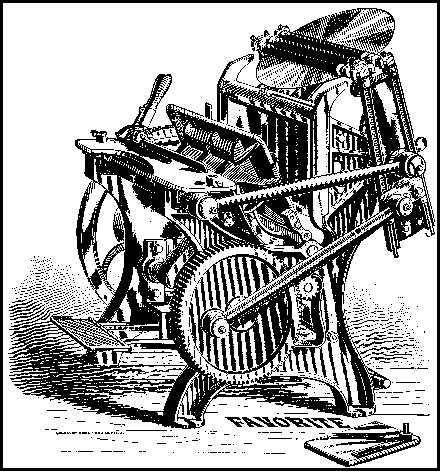Of McPaper
Of USA Today
Peter Prichard
(Andrews, McMeel and Parker)
O moon of Alabama,
We now must say good-bye,
We must have dollars,
Or you know why.

It was not a novel idea, and Snow's writing on the subject was tedious and obfuscatory, as if he had to demonstrate the problem by example. He was made life peer for his observations, but critics suggested that the division was more apparent than real. After all, both scientists and writers, as well as most readers, and those generally interested in the "humanities," carry around with them the common seed of Graeco-Roman philosophy and logic.
If Snow had wanted to earn his peerage and the respect of the centuries, he might have concentrated on a far more serious gulf in Western society. It is the one between those who are literate and those who are not. The percentage of Americans who fail to complete high school is 21.8 (the figure is double for Blacks and Hispanics). Between a quarter and a third of the population cannot master a fifth-grade reading level, and at least 10 percent of the citizens of this country cannot read even the simplest words. (Ten percent doesn't sound like much, but it translates into 25,000,000 people, and with the immigration of many illiterate poor from Central and South America and the Caribbean countries, the unlettered represent the fastest-growing segment of America's population. In this regard, it's certainly as large a growth as that of New Age philosophers, ministers of the Four-Square Gospel, failed stock market brokers, and other speculators.)
Being as this is America, we take everything, including our deficiencies, and turn them into capital commodities. A whole subculture has grown out of the care and feeding of the unlettered and unschooled of our nation. This growth industry includes social workers, bureaucrats, probation officers, and teachers who tend to the needs of the benighted.
Even so, it's difficult to keep up with the demand, for the near-illiterate come to us, in great and greater numbers, courtesy not only of migration, but the media. Television has helped to create a great unwashed, untutored mass; it, in turn, has become the main source of entertainment, distraction, maintenance, and selling to, by, and of those who cannot read. In the average American home, the television set is going seven hours a day; in the homes of the poor and the unlettered, the figure is more than double that. Some have even suggested that the reason the crime rate among the poor in America is so high is not because there are the poor per se: the poverty-stricken in India or Egypt or Nairobi have far fewer survival assets, yet they seem not to be so hostile.
Rather, it is thought that the marginally literate take their values from the one tool that surrounds them ad nauseam --- that is, commercial television. And what values they are! American television offers the demeaning of relationships as the norm; inchoate rage is seen as the human condition; murder and brutality are offered as a viable solution for all problems; consumer goods (especially the more exotic and more expensive) are pictured temptingly; the more bizarre religious miracles are sold like Cheez-Whiz; consumption is seen as a cure-all, presented so that the most regular and noncritical of television's consumers will adopt the values, desires, and beliefs brought into their squalid living rooms by the greatest teaching machine of all times.
Now the purpose of this review is not to defame social workers, HEW bureaucrats, teachers, television station owners, fundamentalist ministers, and the other ne'er-do-wells who feed off the poor and untutored. Instead, we would like to concentrate on the sizable proportion of the population that is neither totally unlearned nor totally literate...namely, those who possess some reading and writing skills --- say, around the eighth-grade level. Studies indicate that this bloc may encompass as much as a third of our country's population. 98 percent of all homes have television sets; 89 percent of the homes have two or more television sets, but it is found that television reaches out and sells itself best to these, the semiliterate, who constitute a great proportion of our total population.
The early history of America may be a study of political and religious forces, but it is, as well, a study of the growth and dominance of mercantilism in our culture. (Some have claimed that the Constitution is best understood studied as an economic document rather than a political one). In the past century, considerable effort has been expended to reach this huge semiliterate market --- and not to sell them on further knowledge. Enlightened on-the-air schooling, ideas presented intelligently and well, might have carried the poor and unlettered into the higher levels of individual wisdom --- sorely needed by a functioning democracy. But, somewhere it was decided that it was preferable to make consumers (rather than patricians) out of the citizenry, to avoid dangerous enlightenment. In this way, instead of marching in the streets and demanding their rights, the populace could be inveigled to a lifetime of consumerism, safely functioning as part of the spending society. Indeed, astute commentators have often stated that America long ago ceased to be an Adam Smith-style capitalistic republic; rather, it quickly become a pure Norman Vincent Peale-style consumerist one.)
 This process of indoctrination began long ago with the newspapers of William Randolph Hearst and his fecund imitators. The penny-dreadful was used to feed every prejudice and lewd desire of the ignorant. With the arrival of electronic communications, it was thought that the printed word might well wither away --- but with the immense success of the Reader's Digest, it was shown that the moving-forefinger-on-the-page market was alive and well.
This process of indoctrination began long ago with the newspapers of William Randolph Hearst and his fecund imitators. The penny-dreadful was used to feed every prejudice and lewd desire of the ignorant. With the arrival of electronic communications, it was thought that the printed word might well wither away --- but with the immense success of the Reader's Digest, it was shown that the moving-forefinger-on-the-page market was alive and well.
The Paradigm of Pleasantville was immensely successful for its publishers and a boon for the semiliterate, for one of the great afflictions facing those with reading problems is the need to hide their problem. The Reader's Digest and its imitators permitted them to participate in the heady world of words drawn not only from other consumerist magazines (Family Circle, Woman's Day, McCalls, the Saturday Evening Post) but, too, from the ones they could barely comprehend on their own (Foreign Affairs, Science, Natural History, and Harpers). These were made available to those with scant reading abilities by having discursive English translated into one- or two-syllable words, appropriate pabulum for the unschooled. (It was no accident that the New Yorker, alone among magazines of the period, refused to grant the Reader's Digest license to hack at their elegant articles and reduce them to literary hamburger.)
The buy-and-sell exploitation market aimed at the estimated 50,000,000 semiliterates in this country is huge, and growing. Critics suggest that the relative success of the computer is a function of Microsoft reaching out for that one-third of the population that has trouble with words. To deal with a keyboard, one must be able to read and --- even harder --- able to write. The untutored will avoid writing like the plague, but, like politicians, life insurance salesmen, and Anabaptists --- they do not want to be unmasked. The computer manufacturers saw this fear, and marketed one of the great literacy crutches of all times: the mouse.
Now the mouse would be useless on its own with a screen full of letters, words, paragraphs, and sentences, so the second great computer invention was the pictorial symbol with the pull-down screen, avoiding written information. It is no accident that the number of razzmatazz sound and picture games available for Windows was, still is, and probably always will be astronomical.